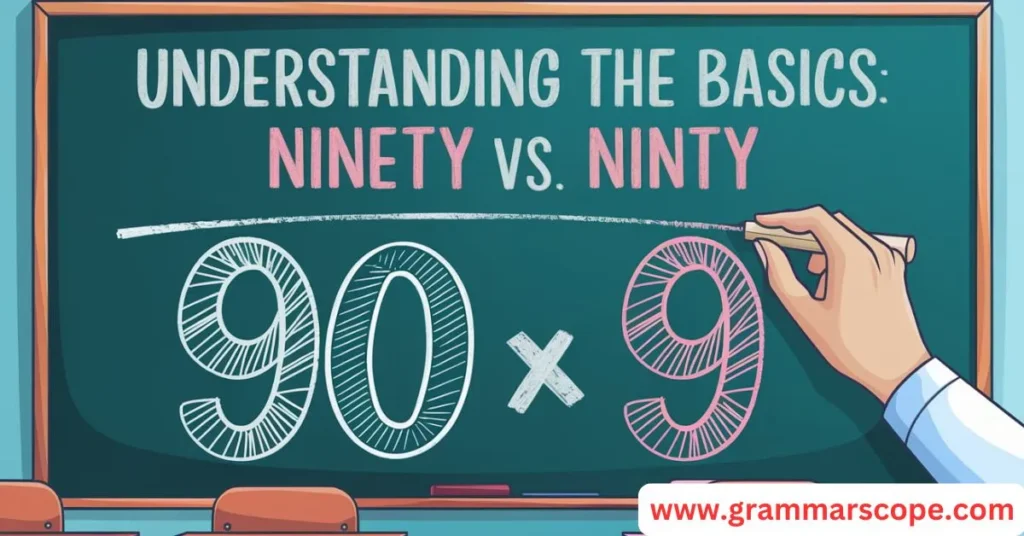Ninety or Ninty? If you’ve ever paused mid-sentence wondering which spelling is correct, you’re not alone. In the fascinating world of English language, even the simplest words can spark confusion. The answer to this spelling conundrum lies in understanding the evolution of the language, where small changes in spelling reflect a broader linguistic history. But here’s the quick takeaway: Ninety is the correct spelling, while Ninty is a common misspelling.
Interestingly, spelling errors like this aren’t limited to casual writing. Many formal documents, emails, and even publications have fallen prey to such mistakes. Why does this happen? The answer lies in phonetics, outdated spelling conventions, and simple typographical errors. In this article, we’ll explore the origins of these words, how to avoid mistakes, and provide practical examples to ensure your writing remains impeccable.
Correct spelling is more than a formality; it’s a reflection of your communication skills. A seemingly minor error like confusing “ninety” with “ninty” can significantly impact how others perceive your professionalism, whether you’re drafting an email to a colleague or writing an important essay. By mastering these nuances, you’ll not only enhance your writing clarity but also leave a lasting impression.
Understanding the Basics: Ninety vs. Ninty

To start, let’s clear the air: Ninety is the standard and universally accepted spelling for the number that follows eighty-nine. Ninty, while often used mistakenly, is not recognized as correct in formal or informal English. This error often occurs due to phonetic spelling, where the pronunciation “nin-tee” misleads writers into omitting the “e.”
Scenario Example:
You’re drafting a formal email:
“Dear Mr. Smith,
Our records show that we transferred ninety thousand dollars to your account on Monday. Please confirm the receipt.”
If you mistakenly write “ninty thousand dollars,” it may lead to unnecessary confusion or even a loss of credibility.
The Importance of Correct Spelling
Correct spelling is essential for maintaining clarity and professionalism in both formal writing and casual conversations. Words like ninety frequently appear in contexts such as contracts, emails, and financial documents, making it critical to use the right term.
Pro Tip
When writing professionally, double-check numbers written as words, especially in crucial documents like agreements or financial statements. Use a spell-check tool or refer to trusted resources like dictionaries to avoid errors.
The Old English Origins of Ninety
The word ninety has fascinating roots in Old English. Derived from “nigontig,” the term reflects the linguistic evolution of numbers over centuries. The shift from Old to Modern English simplified many terms, but errors like “ninty” stem from an incomplete understanding of this historical journey.
Scenario Example
Imagine explaining the word’s origins in a classroom:
“The Old English ‘nigontig’ transitioned into ‘ninety’ over time, but many people mistakenly write it as ‘ninty’ because of the way it sounds.”
The Drop Rule and Other Spelling Tips

One way to avoid misspelling ninety is to remember the drop rule: the “e” in “nine” stays intact when forming the number. Unlike other numbers like “forty,” where letters drop, ninety retains its root.
Practical Example:
Use a mnemonic: “The ‘e’ in ‘nine’ doesn’t vanish in ninety.” Writing this down or saying it aloud can help solidify the correct spelling in your memory.
Using Mnemonics for Clarity
Mnemonics are powerful tools for avoiding common misspellings like this one. Think of a simple phrase such as, “Never ignore nine’s e.” These memory tricks can work wonders, especially when learning English as a second language.
Scenario Example:
In a training email:
“Dear team, remember to use the mnemonic ‘Never ignore nine’s e’ to avoid the common error of writing ‘ninty’ instead of ‘ninety’ in our reports.”
Common Misspellings and Their Impacts
Misspelling ninety as ninty might seem minor, but it can have far-reaching implications, especially in formal writing or professional communication. Inconsistent spelling can confuse readers, detract from your credibility, and even alter the meaning of your message.
Language Consistency in Writing
Consistency is key in effective communication. Whether you’re drafting an email, a financial statement, or a blog post, consistent use of correct terms like ninety reflects a commitment to quality.
Examples of Clarity in Communication
Formal Email Example:
“Dear Sarah,
The budget allocation for this quarter is ninety thousand dollars. Please review the attached file for details.”
Casual Text Example:
“Hey Jake, I’ll be at your place in ninety minutes. See you soon!”
Why It Matters: The Impact of Spelling on Perception
Your choice of words and spelling speaks volumes about your attention to detail. Consistently using correct terms like ninety instead of ninty reinforces your professionalism and helps avoid misunderstandings in writing.
Avoiding Misunderstandings in Writing
Misunderstandings often arise from small errors. A misplaced letter can change the tone or intent of your message. For example, a typo in financial figures can lead to major miscalculations or mistrust.
Writing Tips for Mastering Spelling

- Use online spell-check tools to verify words like ninety.
- Write frequently to become familiar with commonly misspelled terms.
- Always proofread your work to catch errors.
Frequently Asked Question
Is it spelled ninty or ninety?
The correct spelling is “ninety”. The word “ninty” is a common misspelling and does not exist in standard English. “Ninety” follows the pattern of other number spellings and is derived from the Old English term “nigontig.” Always use “ninety” in both formal and informal writing to avoid errors.
Which is correct, forty or fourty?
The correct spelling is “forty”. The word “fourty” is a common misspelling and does not exist in standard English. Although the word “four” includes a “u,” the spelling of “forty” drops the “u” for historical linguistic reasons. Always use “forty” in both formal and informal contexts to ensure proper usage.
What is the real spelling of 90?
The correct spelling of 90 is “ninety.” The word “ninty” is a common misspelling. To remember this, you can use a mnemonic: “Nine has an ‘e’ in it, add ‘ty’ to make ninety.” Always use “ninety” in both formal and informal writing to ensure accuracy.
Is it Ninty three or ninety three?
The correct spelling is “ninety-three” (with a hyphen between “ninety” and “three”). “Ninty-three” is a common misspelling. Always use “ninety-three” to ensure proper spelling in both written and spoken communication.
Final Thoughts on Ninety vs. Ninty
In the fascinating world of English spelling, minor errors like writing ninty instead of ninety can have a big impact. By understanding the origins, using mnemonics, and applying practical spelling tips, you can avoid such pitfalls and ensure your writing remains clear and professional.

Emma Olivia is an experienced blogger and the creative mind behind Grammar Scope. With a passion for language and years of writing expertise, she crafts engaging, informative content that simplifies grammar and writing tips for readers worldwide. Emma’s dedication to clear communication and love for the written word shine through every article she publishes, making Grammar Scope a trusted resource for language enthusiasts and learners alike.







